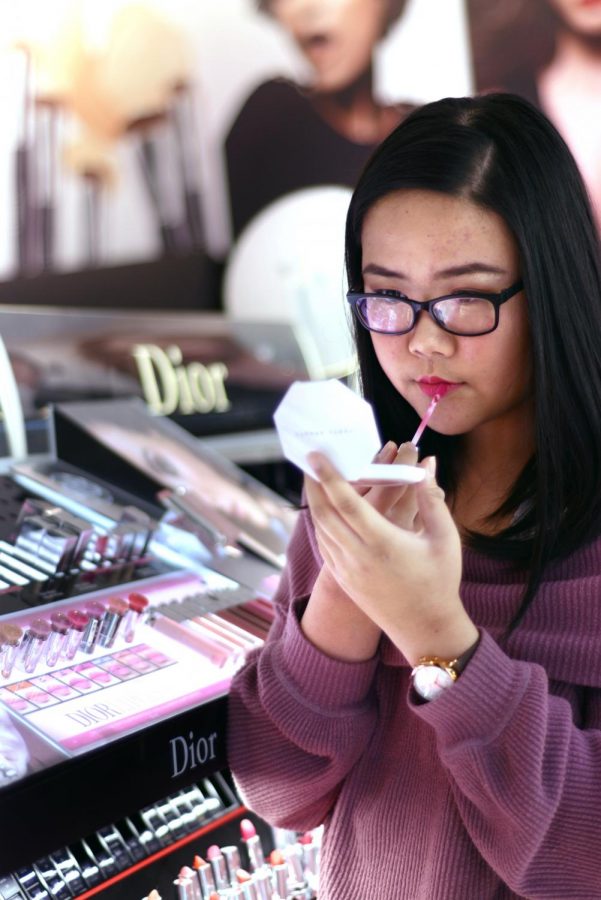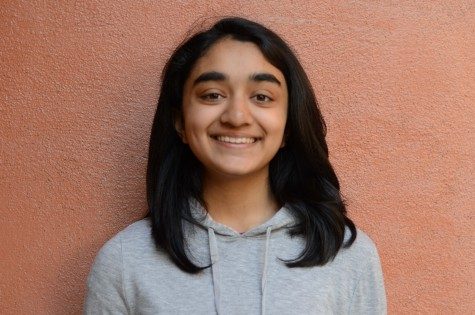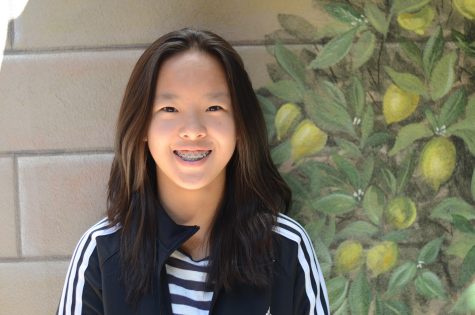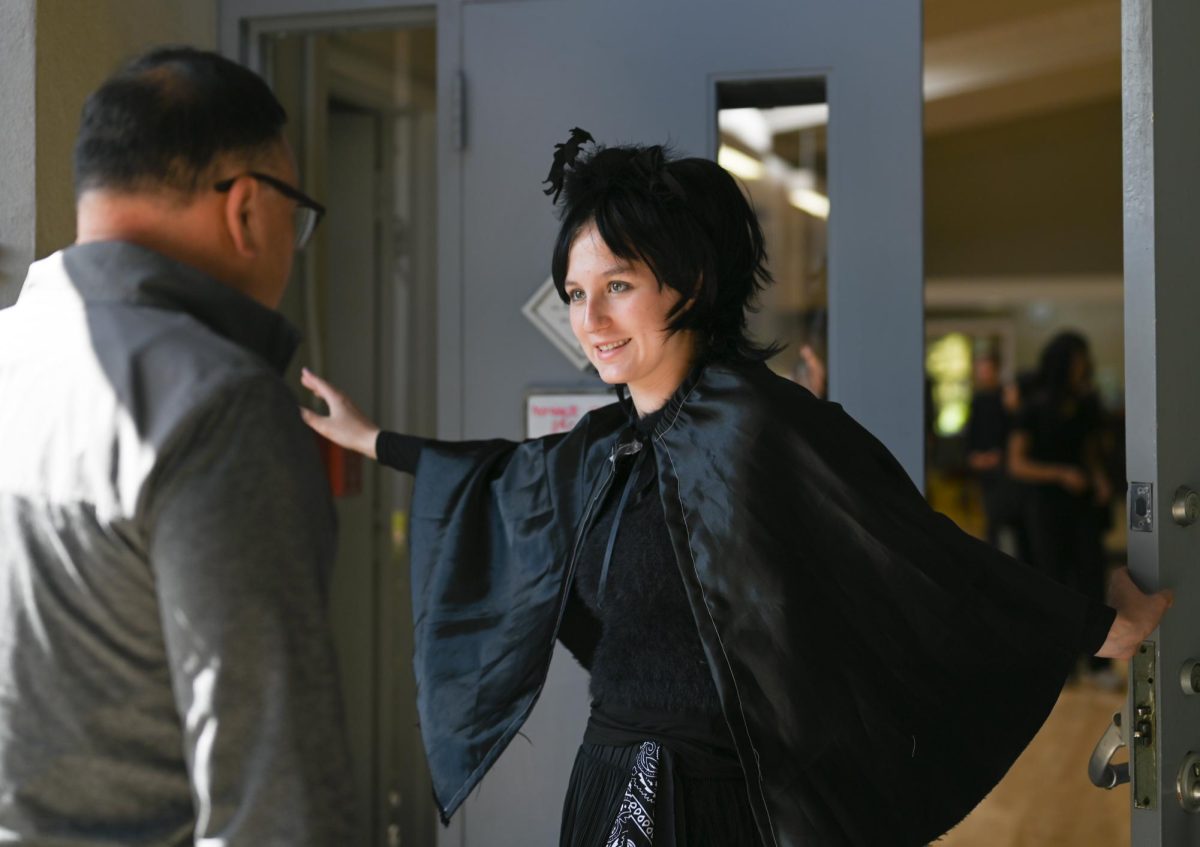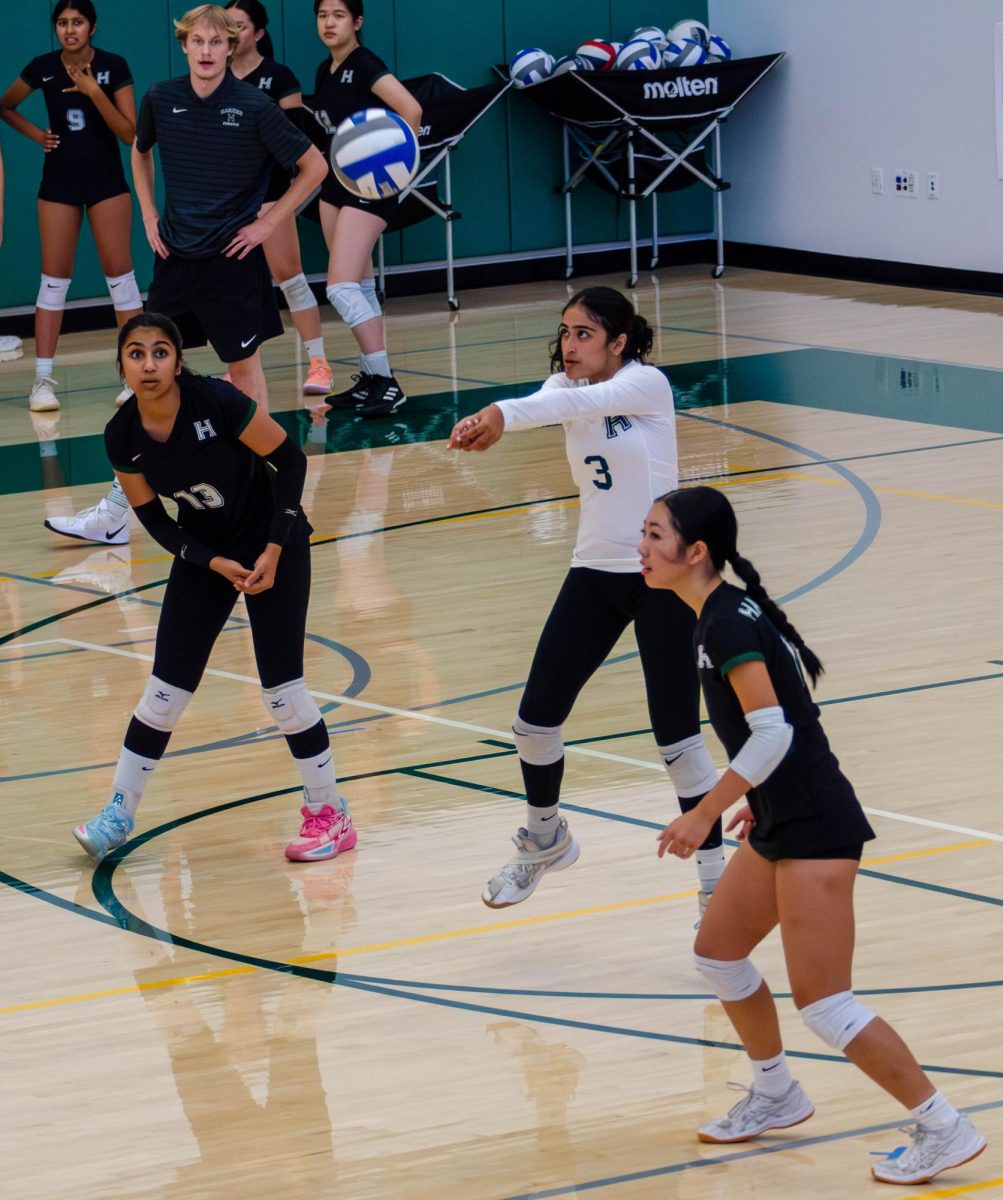Humans of Harker: Mona Lee applies makeup and embraces confident self-expression
“I started doing my eyebrows at the tail end of my sophomore year and that was where I started figuring out that what people think doesn’t really matter all that much,” Mona Lee (12) said. “Because everyone has a different idea of what your eyebrows should look like, who you should be, what you should be like, what you should look like. I kind of realized that at the end of the day I realized it doesn’t matter; the only opinion that matters is your own.”
May 29, 2018
Mona Lee (12) owns 50 lipsticks. But she only puts any of them on after lunch.
She fills in her eyebrows by 9:30 a.m., in passing period, in class or in the car, for five minutes. Winged eyeliner occasionally gets looped in after her first class of the day. Next comes lip balm in the late morning, and finally, after eating, her signature lipstick. Eyeshadow makes infrequent appearances, but when it does feature, it typically snags a slot in her morning car commute.
“I started doing my eyebrows at the tail end of my sophomore year and that was where I started figuring out that what people think doesn’t really matter all that much,” Mona said. “And for senior portraits, I went pretty all-out with my makeup, and then I was like, ‘okay, I am content with this appearance. I am happy.’ I remember someone was like, ‘why are you wearing so much makeup,’ and I was like, ‘whatever, I don’t care.’ That moment was the first time that I was able to say, ‘I do not care what you think of me.’”
Mona considers makeup a form of pure self-expression, one that’s been freeing in helping her both push past others’ opinions and reinforce her own confidence.
“A lot of people were saying ‘why are you wearing so much makeup for school?’” Mona said. “Why not? I like red lipstick. It makes me happy.”
In the last two years, much of what Mona has learned about makeup comes from YouTube tutorials, particularly from the channel From Head to Toe, which helps her blend Korean and Western makeup styles for features similar to Mona’s own.
“The boldness that comes from the West and the sense of subtlety and sense of quaint and petite and delicate from the Eastern beauty standard––I’m trying that blend in between, where it’s bold but not too bold,” she said. “It’s just enough where I feel happy with myself, but not so bold that I do not feel comfortable going out in public like this.”
Mona’s friends have noticed her confidence develop throughout high school.
“She’s definitely arrived at a point where she’s able to express herself confidently and without too much consideration for what other people think of her,” Emily Chen (12) said. “Mona is always very vocally expressive about things that she values, people that she values and relationships that she values. It’s rare to see someone who is so defiant of the expectation that people should be more blasé and nonchalant about things that they care about. Mona is someone who openly advocates for what she views as important, and that’s something I really love and respect her for.”
That advocacy, care and valuation extends into academics in a way that makes other students––and Mona herself––define her as “extra,” the kind of “extra” that leads Mona to create extensive, color-coordinated class notes and concept summaries and to leave her notes online, open-source.
“Mona is the screaming id that we all have of the eternal panic and lack of chill over academics, personified,” Serena Lu (12) said.
“A lot of people would fall into the cliche of [describing Mona via] her multicolored pens or the notebooks that have the backup notebooks––that’s not me,” Mona’s college counselor Martin Walsh said. “What makes Mona spectacular is her dogged pursuit to make her senior year more than just about academics.”
And Mona has done that––via a first semester spent playing foosball during her free periods, the care she puts into spending time with friends and through her mentoring of middle school girls in robotics.
Mona herself has done VEX robotics since middle school, and her team has won multiple awards at World Championships.
After last year’s Championships, a robotics forum post asserted that Mona’s team won because they’re girls, and the judges are trying to support girls in robotics.
“There’s enough discrimination in this world as it is; I don’t need this to be starting in this robotics competition for high schoolers and middle schoolers,” she said. “You don’t need children thinking their successes aren’t valid just because they are girls.”
So Mona took it upon herself to actually support younger girls in robotics,
“Once you get to a place where you have a platform, you have to use that platform,” she said. “People around here know who I am, they respect me, [and] they respect my accomplishments, so why won’t they respect other girls like me? And then I was like, ‘I can’t really change them.’ I tried, but I feel like there’s only so much you can do just by telling them something; you need to show them.
“Then there was this idea of helping these [girl scout robotics] teams get to a place where they are strong in this competition to show other people that they deserve to be here and we deserve to be here.”


















![“[Building nerf blasters] became this outlet of creativity for me that hasn't been matched by anything else. The process [of] making a build complete to your desire is such a painstakingly difficult process, but I've had to learn from [the skills needed from] soldering to proper painting. There's so many different options for everything, if you think about it, it exists. The best part is [that] if it doesn't exist, you can build it yourself," Ishaan Parate said.](https://harkeraquila.com/wp-content/uploads/2022/08/DSC_8149-900x604.jpg)




![“When I came into high school, I was ready to be a follower. But DECA was a game changer for me. It helped me overcome my fear of public speaking, and it's played such a major role in who I've become today. To be able to successfully lead a chapter of 150 students, an officer team and be one of the upperclassmen I once really admired is something I'm [really] proud of,” Anvitha Tummala ('21) said.](https://harkeraquila.com/wp-content/uploads/2021/07/Screen-Shot-2021-07-25-at-9.50.05-AM-900x594.png)







![“I think getting up in the morning and having a sense of purpose [is exciting]. I think without a certain amount of drive, life is kind of obsolete and mundane, and I think having that every single day is what makes each day unique and kind of makes life exciting,” Neymika Jain (12) said.](https://harkeraquila.com/wp-content/uploads/2017/06/Screen-Shot-2017-06-03-at-4.54.16-PM.png)








![“My slogan is ‘slow feet, don’t eat, and I’m hungry.’ You need to run fast to get where you are–you aren't going to get those championships if you aren't fast,” Angel Cervantes (12) said. “I want to do well in school on my tests and in track and win championships for my team. I live by that, [and] I can do that anywhere: in the classroom or on the field.”](https://harkeraquila.com/wp-content/uploads/2018/06/DSC5146-900x601.jpg)
![“[Volleyball has] taught me how to fall correctly, and another thing it taught is that you don’t have to be the best at something to be good at it. If you just hit the ball in a smart way, then it still scores points and you’re good at it. You could be a background player and still make a much bigger impact on the team than you would think,” Anya Gert (’20) said.](https://harkeraquila.com/wp-content/uploads/2020/06/AnnaGert_JinTuan_HoHPhotoEdited-600x900.jpeg)

![“I'm not nearly there yet, but [my confidence has] definitely been getting better since I was pretty shy and timid coming into Harker my freshman year. I know that there's a lot of people that are really confident in what they do, and I really admire them. Everyone's so driven and that has really pushed me to kind of try to find my own place in high school and be more confident,” Alyssa Huang (’20) said.](https://harkeraquila.com/wp-content/uploads/2020/06/AlyssaHuang_EmilyChen_HoHPhoto-900x749.jpeg)



